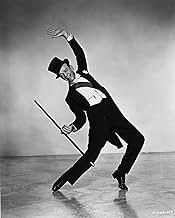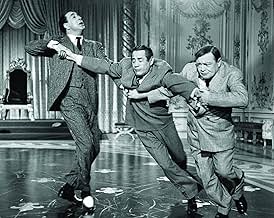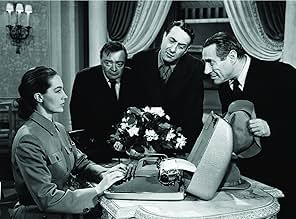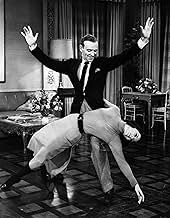CALIFICACIÓN DE IMDb
6.8/10
4.5 k
TU CALIFICACIÓN
Una funcionaria del gobierno ruso es enviada a París para traer de vuelta a sus camaradas; pronto se familiariza con la vida parisina y se enamora de un productor de cine estadounidense.Una funcionaria del gobierno ruso es enviada a París para traer de vuelta a sus camaradas; pronto se familiariza con la vida parisina y se enamora de un productor de cine estadounidense.Una funcionaria del gobierno ruso es enviada a París para traer de vuelta a sus camaradas; pronto se familiariza con la vida parisina y se enamora de un productor de cine estadounidense.
- Dirección
- Guionistas
- Elenco
- Premios
- 5 nominaciones en total
Don Anderson
- Restaurant Patron
- (sin créditos)
Edit Angold
- Wife
- (sin créditos)
Frank Arnold
- Soviet Guard
- (sin créditos)
Susan Avery
- Model
- (sin créditos)
Virginia Bates
- Model
- (sin créditos)
Herman Belmonte
- Reporter
- (sin créditos)
Rodney Bieber
- Dancer
- (sin créditos)
John Bleifer
- Tenant
- (sin créditos)
Opiniones destacadas
Like so many films produced in the mid- to late Fifties and early Sixties, when CinemaScope and other widescreen processes enhanced a production, directors and cinematographers were usually unafraid to take full advantage of the wider ratio. They weren't so concerned about how the final product would look on TV's square screens and probably didn't anticipate the visual desecration of "formatting" and "pan-and-scan" reductions. So it's nice to know that this musical, filmed when M-G-M was about to throw in the musical towel and bid an undeserved farewell to the Arthur Freed "unit," can now be enjoyed again close to its original theatrical aspect ratio on DVD.
Astaire and Charisse are a team to be treasured (so wonderful together in "The Band Wagon" a few years earlier, under Minnelli's astute guidance) and all of the others listed in this film's credits are professionals of the highest caliber. Astaire has a fun solo (with a chorus of top-hatted dancers) in the "Ritz Roll 'n' Rock" number; Cyd gets to put those legendary legs to dazzlingly opulent use in the "Red Blues" production show-stopper; and even Janis Paige gets to raunch it up in an amusing example of clever Cole Porter risking something risqué (for its day) in a song about the Empress Josephine, "commonly known as Jo"! And there's that first reel number, "Stere-oh-phonic Sound," that cleverly spoofs the contemporary moviemakers' attempts to lure people from their TV sets with widescreens, sound coming from every corner of the auditorium and eye-glazing color processes. It may not be prime Porter but it's all far-and-away more fun and enjoyable than anything we're likely to get today with the threatened revival of the movie musical with barbarians like Baz Luhrmann given the directorial reins.
Astaire and Charisse are a team to be treasured (so wonderful together in "The Band Wagon" a few years earlier, under Minnelli's astute guidance) and all of the others listed in this film's credits are professionals of the highest caliber. Astaire has a fun solo (with a chorus of top-hatted dancers) in the "Ritz Roll 'n' Rock" number; Cyd gets to put those legendary legs to dazzlingly opulent use in the "Red Blues" production show-stopper; and even Janis Paige gets to raunch it up in an amusing example of clever Cole Porter risking something risqué (for its day) in a song about the Empress Josephine, "commonly known as Jo"! And there's that first reel number, "Stere-oh-phonic Sound," that cleverly spoofs the contemporary moviemakers' attempts to lure people from their TV sets with widescreens, sound coming from every corner of the auditorium and eye-glazing color processes. It may not be prime Porter but it's all far-and-away more fun and enjoyable than anything we're likely to get today with the threatened revival of the movie musical with barbarians like Baz Luhrmann given the directorial reins.
Clever, witty and charming musical, courtesy M.G.M. and the Arthur Freed unit, of which this was one of their last films. One of several musical remakes (of non-musical pictures) that the studio produced in the mid-late 1950s. This is one of the best.
Fred Astaire plays his usual character, the playboy-ish bachelor, in this case a film producer, wanting to use a Russian composer's music for his new film. Cyd Charisse plays Ninotchka, the Russian woman who comes to Paris to bring back the composer and three comrades who failed to return him to his native land. As the three comrades, Jules Munshin, Peter Lorre (holding onto a chair as he dances), and Joseph Buloff are a hoot, adding good comic relief in their "Too Bad" and "Siberia" numbers. Janis Paige is a jewel as the ditzy actress hired for the new film. She radiates with Astaire in the memorable "Stereophonic Sound" number, as well as in her own hilarious "Satin and Silk".
Charisse, (whose wooden acting is OK here), is lovely as usual and has a few excellent dances, including the sensual "All of You" (with Astaire), the lively "Red Blues", and the stunning ballet where she removes her old Russian garb, for her new Parisian silks. This was the second of her two pairings with Astaire, and though this is not the gem that "The Band Wagon" is, it still sparkles nonetheless.
A clever and classy musical, with some very topical humor. Great songs by Cole Porter (with the exception of the tacky "Ritz, Roll and Rock"...a poor punch at rock and roll). Excellent use of color and the Cinemascope frame help to make this one of the last great musicals of the 1950s.
Fred Astaire plays his usual character, the playboy-ish bachelor, in this case a film producer, wanting to use a Russian composer's music for his new film. Cyd Charisse plays Ninotchka, the Russian woman who comes to Paris to bring back the composer and three comrades who failed to return him to his native land. As the three comrades, Jules Munshin, Peter Lorre (holding onto a chair as he dances), and Joseph Buloff are a hoot, adding good comic relief in their "Too Bad" and "Siberia" numbers. Janis Paige is a jewel as the ditzy actress hired for the new film. She radiates with Astaire in the memorable "Stereophonic Sound" number, as well as in her own hilarious "Satin and Silk".
Charisse, (whose wooden acting is OK here), is lovely as usual and has a few excellent dances, including the sensual "All of You" (with Astaire), the lively "Red Blues", and the stunning ballet where she removes her old Russian garb, for her new Parisian silks. This was the second of her two pairings with Astaire, and though this is not the gem that "The Band Wagon" is, it still sparkles nonetheless.
A clever and classy musical, with some very topical humor. Great songs by Cole Porter (with the exception of the tacky "Ritz, Roll and Rock"...a poor punch at rock and roll). Excellent use of color and the Cinemascope frame help to make this one of the last great musicals of the 1950s.
Astaire too old! Gimme a break. He danced with a polish that was always present. Charisse should have been grateful for his presence and I suspect that she was.
A characiture of the USSR and America of the Cold War period? Yes indeed, and it was almost as good as "One, Two, Three" in its dialogue and situation. Its sensuality as presented in its dance numbers far exceeded the 1939 version and all comers of the same subject.
I had no problem watching a 56 year old Astaire romancing a 36 year old Charisse. As a matter of fact, I found the pair quite sensuous.
I have often wondered why in the final dance scene Cyd's costume skirt was switched to a cullote in the middle of the scene. The switch was not seamless as it was very noticeable.
But, all in all I give this delightful musical a rating of 8 on a 0 to 10 scale.
Dave
A characiture of the USSR and America of the Cold War period? Yes indeed, and it was almost as good as "One, Two, Three" in its dialogue and situation. Its sensuality as presented in its dance numbers far exceeded the 1939 version and all comers of the same subject.
I had no problem watching a 56 year old Astaire romancing a 36 year old Charisse. As a matter of fact, I found the pair quite sensuous.
I have often wondered why in the final dance scene Cyd's costume skirt was switched to a cullote in the middle of the scene. The switch was not seamless as it was very noticeable.
But, all in all I give this delightful musical a rating of 8 on a 0 to 10 scale.
Dave
"Silk Stockings" is something of an enigma. Its release came at the moment much of America had switched over to viewing television and the musical film was dying. But it was still glorious. I couldn't care less about the 'outdated Red Russia' story line; this is a remake of a 1939 film and the USSR conflict was in the original as well. What're you gonna do? The main focus is on capitalist seduction- first by Tobias, Munshin, and Peter Lorre, then most beautifully by Astaire and Charisse. Note that in their first duet (the non-dancing "Paris Loves Lovers"), as they sing in perfect counterpoint, they appear to be undressing each other with their eyes. Later, in "All of You," the gloves come off and our two leads seduce each other through a most graceful dance in a living room. Astaire was 56 years old, Charisse was about 36, and there is still more electricity in their pairing than in some of the downright silly things passing as romantic comedies today. The undisputed highlight of the film is Ms. Charisse in a silent and sensuous expression of terpsichory as she puts on nude stockings, a camisole, and a flared transparent slip. OMG!!
As "Silk Stockings" reaches the half-century mark, it is now so dated that it can be enjoyed either as a period piece, as a look at popular attitudes toward the Cold War, as a rather silly but enjoyable setting for the odd couple of Cyd Charisse and Fred Astaire, or as a chance to see character actors like Jules Munchin and Peter Lorre. You know it's an old movie when Technicolor and stereophonic sound are being touted as the new big things!
Whether you like the main movie or not, the DVD extras have their own charm. The Special Features section includes a short film with Cyd Charisse as narrator, made about 2003, in which she talks about Cole Porter, Fred Astaire, and how the film came to be. Another short b/w film from the thirties is called "Paree, Paree". This one stars a very young Bob Hope, and features Cole Porter songs from the musical "20 Million Frenchmen".
Another musical treat is the "Poet and Peasant Overture", written by Franz von Suppe, played by the full studio orchestra. Both the 'Paree' film and this overture will tease you with musical strains familiar to those of us who grew up with old cartoons, so be warned! Listening to this music may induce animation flashback.
Whether you like the main movie or not, the DVD extras have their own charm. The Special Features section includes a short film with Cyd Charisse as narrator, made about 2003, in which she talks about Cole Porter, Fred Astaire, and how the film came to be. Another short b/w film from the thirties is called "Paree, Paree". This one stars a very young Bob Hope, and features Cole Porter songs from the musical "20 Million Frenchmen".
Another musical treat is the "Poet and Peasant Overture", written by Franz von Suppe, played by the full studio orchestra. Both the 'Paree' film and this overture will tease you with musical strains familiar to those of us who grew up with old cartoons, so be warned! Listening to this music may induce animation flashback.
¿Sabías que…?
- TriviaAfter this film, Fred Astaire effectively retired from musicals, preferring to concentrate on non-musical roles, though he would produce several musical specials for TV in the next few years. He wouldn't make another musical until El camino del arco iris (1968).
- ErroresIt becomes fairly obvious during the "Fated to be Mated" duet between Fred Astaire and Cyd Charisse that Charisse is wearing a skirt one moment and culottes (or flared shorts) the next. The bottom half of her costume changes on each cut of the dance when they are doing deep knee bends, and this is where the culottes show. For the upright spins and lifts, the skirt shows. The dance was obviously performed twice and edited into one sequence.
- Citas
Vassili Markovitch, Commisar of Art: I want to look somebody up. Does this office have a copy of Who's Still Who?
- ConexionesEdited into Histoire(s) du cinéma: Une histoire seule (1989)
- Bandas sonorasI've Got You Under My Skin
(1936) (uncredited)
Music by Cole Porter
Heard at the beginning as Steve and Boroff arrive at the hotel
Selecciones populares
Inicia sesión para calificar y agrega a la lista de videos para obtener recomendaciones personalizadas
- How long is Silk Stockings?Con tecnología de Alexa
Detalles
Taquilla
- Presupuesto
- USD 1,853,463 (estimado)
- Total a nivel mundial
- USD 9,755
- Tiempo de ejecución
- 1h 57min(117 min)
- Mezcla de sonido
- Relación de aspecto
- 2.35 : 1
Contribuir a esta página
Sugiere una edición o agrega el contenido que falta

































